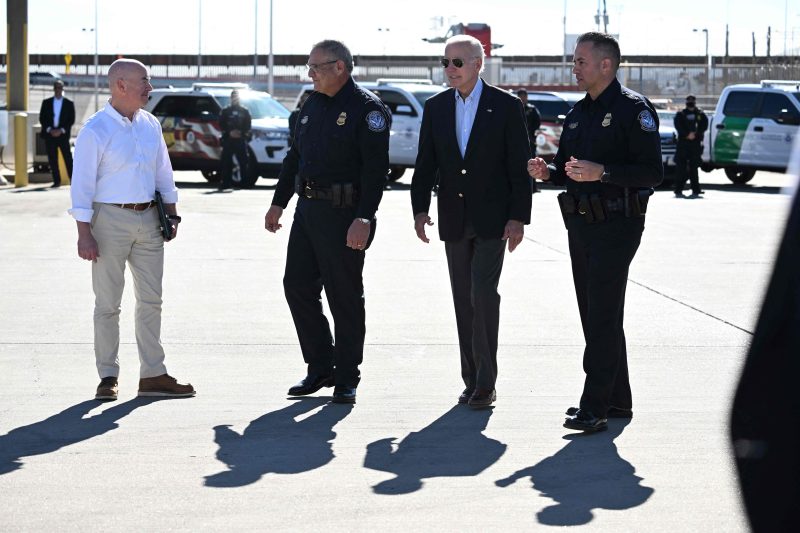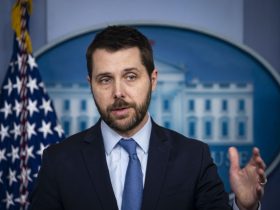EL PASO — President Biden on Sunday made his first trip to the southern border since his election two years ago, seeking to blunt criticism that his immigration policies have been ineffective and increasingly less humane than he promised.
This border town has become a symbol of the crush of migrants trying to enter the United States and a system ill-equipped to handle them. Last month, El Paso’s mayor declared a state of emergency amid the increase in migrants, including dozens who slept on benches in downtown streets as temperatures dipped below freezing.
Biden announced the visit last week, adding the stop to the beginning of a presidential trip to Mexico City for the North American Leaders’ Summit, where hemispheric migration will be one of the top issues discussed.
On Sunday, Biden toured enforcement operations and spoke with border patrol agents at the city’s busiest crossing. He walked along a border fence and then met with local officials, faith leaders and aid groups at a migrant services center.
Asked what he’s learned during the trip, he said: “They need a lot of resources. We’re going to get it for them.”
The president traveled with several members of Congress and a coterie of local and federal law enforcement officers. Days earlier, he unveiled an immigration plan that included expanded programs to remove migrants from the United States quickly without letting them seek asylum. The plan did little to silence Biden’s Republican critics. It has also drawn fire from pro-immigrant groups and even Democratic allies who say it endangers migrants and erodes the humanitarian bedrock of asylum.
As a presidential candidate, Biden said he would rip up the immigration measures of President Donald Trump — who rose to power in part on anti-immigrant sentiment — and enact immigration policies that are both effective and humane. But Republicans took control of the public narrative as border apprehensions surged. And Biden, who has said he will seek reelection in 2024, has sought to counter some of the criticism about his immigration policies and the record number of immigration apprehensions the nation has seen under his watch.
Republicans have sought to place the immigration problems solely at Biden’s feet and have blasted him for not making a trip to the southern border during the first two years of his presidency. In recent months, Republican governors — including those rumored to be mulling presidential runs of their own — shipped migrants to liberal-leaning places, including New York City, Martha’s Vineyard and, on Christmas Eve, the sidewalk outside Vice President Harris’s residence.
Texas Gov. Greg Abbott (R) told Maria Bartiromo on Fox Business that Biden’s visit “is about two years too late and about $20 billion short of what needs to be done.” He added, “He’s not going to achieve my solutions that will make the border safer, more secure and stop illegal immigration.”
Sen. Shelley Moore Capito (R-W.Va.) wrote in a Fox News op-ed on Saturday that it’s taken Biden too long to visit the border. “This checks a box, but it doesn’t even begin to solve the problems we are facing there,” she said.
Biden, in turn, has cast some of the blame on Congress, saying the only enduring solution to the immigration crisis is a legislative one. On Thursday, as he unveiled the immigration policy changes, he said some members of Congress sought to rack up political points on the issue — and that the legislature didn’t act on his first immigration funding request as president or his most recent one.
“If the most extreme Republicans continue to demagogue this issue and reject solutions, I’m left with only one choice: to act on my own, do as much as I can on my own to try to change the atmosphere,” Biden said Thursday.
The latest changes unveiled affect entrants from Cuba, Nicaragua, Venezuela and Haiti — nationalities whose numbers have swelled at the border in recent months. The measures, which reflect a political shift to the center for Biden, will broaden his authority to grant legal entry to tens of thousands of people from those countries. But migrants from those countries who attempt to enter the United States without authorization will risk rapid expulsion to Mexico.
Under the new measures, up to 30,000 migrants from Cuba, Haiti, Nicaragua and Venezuela would be admitted via “parole” each month, as long as they have a U.S. financial sponsor, officials said.
The move amounts to a major expansion of a parole program that previously would accept only Venezuelans and capped the total number from that country at 24,000. The changes overall will probably mean fewer migrants from those four countries entering the United States illegally, and more unauthorized border crossers sent back to Mexico, which has agreed to accept 30,000 returnees a month.
The American Civil Liberties Union, which has led the legal battle to stop the expulsions since the Trump administration, criticized Biden for continuing to rely on a pandemic-era public health policy called Title 42, saying expelling asylum seekers will send them into dangerous border cities where some have been kidnapped or killed.
“This knee-jerk expansion of Title 42 will put more lives in grave danger,” Jonathan Blazer, the ACLU’s director of border strategies, said in a statement.
On Sunday, Rep. Dan Crenshaw (R-Tex.) cautioned against accepting the administration’s plans at face value, saying on CNN’s “State of the Union” that the administration is “just changing how the migrants get into the country” and “you’re just reprocessing them in a different way.”
“We will not be tricked into thinking that certain policies that make it seem more streamlined, make it seem less chaotic equals securing the border,” Crenshaw said.
Key elements of Biden’s immigration proposals
1/4
End of carousel
The White House has pushed back against similar criticism, saying that immigration problems can’t be placed solely at Biden’s feet. Over the last week, administration officials have stressed that it is a multifaceted problem with many factors: unrest in Latin American countries; Congress’s inability to pass comprehensive immigration reform; even a surge in migration across the globe.
“We have surged resources to address a challenge that is not unique to the southern border of the United States,” Homeland Security Secretary Alejandro Mayorkas said Sunday on ABC’s “This Week.” He noted that migrants from Nicaragua and Venezuela, two of the countries for which Biden announced a special parole program last week, have also surged into Colombia and Costa Rica. “It’s gripping the hemisphere, and a regional challenge requires a regional solution.”
In advance of Biden’s border visit, lawmakers from both sides of the aisle traded barbs on immigration policy. “There’s no doubt that there is a problem at the border, and President Biden recognizes it and it’s common sense,” Rep. Ro Khanna (D-Calif.) said on “Fox News Sunday.” “We need to secure the border, but also have the humanity.”
“I hope we could get some bipartisan consensus on this,” Khanna said of Biden’s new policy. “We need to distinguish between people who are coming here just for economic reasons and people who are really fleeing persecution.”
Rep. Jim Jordan (R-Ohio) said Biden and Democrats did not do enough to prioritize solving illegal immigration when they controlled the White House and both chambers of Congress. “They just controlled all of government literally a couple of weeks ago,” he said on “Fox News Sunday.” “Why in the world didn’t they get an immigration solution?”
From here, Biden went directly to Mexico City on Sunday night for the long-planned summit. Biden will meet Monday with Mexican President Andrés Manuel López Obrador. The next day, he’ll meet with Canadian Prime Minister Justin Trudeau, and that night, the trio will gather for the formal agenda of the North American Leaders’ Summit, colloquially called the Three Amigos Summit.
White House national security spokesman John Kirby said during a news briefing Friday that Biden will focus on three topics: climate change, migration and drugs — particularly fentanyl.
Karen DeYoung, Sabrina Malhi, Azi Paybarah and Nick Miroff contributed to this report.








